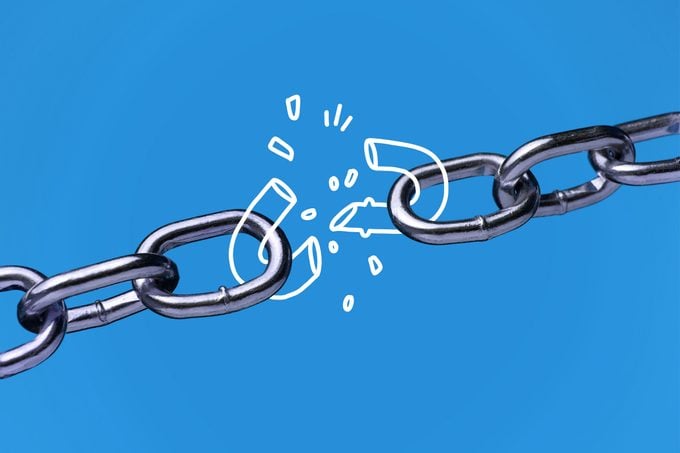How to Build Emotional Strength for Maximum Confidence
Updated: Dec. 08, 2023

With these expert techniques, you can develop the self-assurance and emotional strength to face whatever life throws at you
How can you be prepared for what’s ahead in life, good or bad? Building emotional strength can help you learn how to be confident in handling its twists and turns. But emotional strength doesn’t mean pushing aside or suppressing negative feelings or emotions; instead, it means acknowledging them and finding healthy ways to process and respond to them. “Emotional strength allows individuals to maintain their well-being and adapt to life’s inevitable ups and downs,” says empowerment coach Amy Lombardo.
Learning how to recognize and regulate the emotions you’re feeling can give you more control in personal, social and work situations. “When we are better able to manage our thoughts and reactions, we often feel an increased sense of self-confidence and a greater sense of self-worth too,” Lombardo says. And the best part is, it’s never too late to build emotional strength.
“Emotional strength is not fixed—it is a skill that can be developed and strengthened over time,” Lombardo says. “Just like physical strength, it requires consistent practice and effort.” Want to get out of your comfort zone and try new things? Let’s look at what emotional strength is, how you can leave your comfort zone to build it and why it’s an important trait to have.
Get Reader’s Digest’s Read Up newsletter for confidence tips, humor, cleaning, travel, tech and fun facts all week long.
What is emotional strength?
“Emotional strength refers to one’s ability to cope with and navigate through challenging emotions, situations and experiences, and manage stress and setbacks effectively,” Lombardo says. It’s part grit, part self-reflection and part changing your outlook—but it never veers into toxic positivity.
Emotional strength isn’t about maintaining a stiff upper lip, being stoic or never showing emotion—actually, it’s the opposite. “Emotional strength is about having the skills you need to regulate your feelings,” says psychotherapist Amy Morin, author of 13 Things Mentally Strong People Don’t Do. “You don’t need to chase happiness all the time. Instead, you can develop the courage you need to work through uncomfortable feelings, like anxiety and sadness.”
Someone with emotional strength, for instance, will know when to shift their emotional state, says Morin. “If their anxiety isn’t serving them well, they have strategies they can use to calm themselves. They also have the ability to tolerate difficult emotions, but they do so by embracing them, not suppressing them. They don’t distract themselves from painful feelings, like loneliness.”
How emotional strength helps to handle feelings
Feelings themselves, Morin says, aren’t inherently good or bad; so emotional strength can help you decide whether your feelings are helping or hurting in specific situations. “Anxiety is your friend when it keeps you safe, but it’s your enemy when it keeps you from doing fun things. Sadness is your friend when it helps you honor something you’ve lost, but it’s your enemy when it makes it hard to get out of bed,” she says. “Emotions aren’t either positive or negative. Any emotion can be a friend or enemy.” Recognizing if your emotion is friend or foe is a part of emotional strength; then, you can decide how to move forward.
How is emotional strength different from emotional intelligence?
Emotional strength, also called mental strength or mental toughness, shares some characteristics with related concepts like emotional intelligence and resilience, but they’re not exactly the same. “Emotional intelligence involves understanding how other people feel and communicate based on your knowledge of someone else’s emotional state; whereas emotional strength is more personal,” Morin says. “It involves shifting the thoughts that aren’t helpful and taking productive action.”
Similarly, “resilience is about bouncing back from hardship—emotional strength is needed in both good times and bad,” Morin says. Resilience, however, does play a role in emotional strength. To have emotional strength, you need to be resilient in the face of adversity, Lombardo says. “Resilience is the ability to bounce back from setbacks, to maintain a positive outlook and to adapt to change.”
What are some key characteristics of emotional strength?

People with emotional strength have certain characteristics in common, such as:
- Self-awareness: “You have a lot of autonomy in how you want to react to an emotion, but first you must be aware that you even have it!” Lombardo says. “This is often easier said than done, as many of us have been conditioned to suppress or ignore our feelings. By taking the time to tune in and acknowledge what we’re experiencing, we can begin to build a deeper understanding of ourselves and our emotional landscape in order to develop greater emotional strength.”
- Emotional regulation: “We recognize and manage our emotions so we can communicate in a more composed and empathetic manner, rather than reacting impulsively,” Lombardo says. Instead of reacting instantly to unexpected triggers, people with emotional strength take a beat, listen actively and consider their perspective before responding.
- Facing problems head on: Avoiding discomfort often backfires and leads to more suffering, Morin says. “The fear of uncomfortable emotions is at the root of many problems in life,” she says. For example, “while, ignoring a financial problem may reduce anxiety initially, facing the pile of bills head-on is what heals anxiety in the long-term.” Emotional strength can help you face even your biggest fears with confidence, and in a healthy manner.
- Vulnerability: Vulnerability is one of the hallmarks used by psychologists to describe emotional strength. “To be emotionally strong, we need to be able to embrace discomfort and build up our tolerance for vulnerability,” Lombardo says. This means allowing all feelings to flow freely, and to be honest with ourselves about them.
- Adaptability: Changing or unexpected circumstances can work to your advantage if you’re emotionally strong enough to adapt to them and find alternate ways around problems. “When we are emotionally strong, we become better equipped to handle difficult situations without being overwhelmed,” Lombardo says.
- Intentionality: We feel best about ourselves and most in control when we make choices intentionally and deliberately. “In whatever is occurring—and I mean anything—use your emotional strength to get in the driver’s seat and choose your intentions,” says psychologist and coach Tracy Thomas, PhD. “Focus on outcomes over your reactions.” People with emotional strength choose how to respond to certain circumstances, and in doing so, find their own power and confidence.
- Emotional flexibility: People with emotional strength are always growing and learning new things—when life hands them lemons, emotional strength helps them make lemonade. “By seeking truth and growth over comfort, we challenge the status quo and push the boundaries of our own intellectual and emotional limits,” Lombardo says. “We become active participants in our own personal evolution, constantly refining and expanding our understanding of ourselves, others and the world.”
- Self-compassion: Everyone makes mistakes, and these mistakes do not define our worth—so emotionally strong people aren’t self-criticizing. “This means acknowledging our imperfections and treating ourselves with kindness and understanding, just as we would a close friend,” Lombardo says. “By embracing self-compassion, we can cultivate a sense of inner peace and acceptance, allowing us to navigate life’s challenges with greater ease.”
Why is emotional strength important?
By using our emotional strength, we’re better able to handle challenging circumstances and find purpose and happiness in life. Research has shown that emotional strength is an important component of overall health and well-being, even in children and adolescents.
“Having a strong emotional foundation allows for healthier relationships, effective problem solving and a more positive outlook on life,” Lombardo says. “It helps us cope with setbacks, handle stress and navigate life’s challenges with more grace.” Then, we’re able to feel confident in our abilities without fear of failure or making mistakes, and we learn how to stop comparing ourselves to others.
In addition to giving us a sense of personal growth, confidence and self-empowerment, emotional strength helps us in our relationships with others. “Because emotional strength allows us to feel more resourced, it also enables us to offer more support and empathy to others in times of need,” Lombardo says.
Finally, it can help improve our mental health. “[Emotional strength] allows us to acknowledge and process our emotions more effectively and reduces the likelihood of them manifesting as anxiety or depression,” Lombardo says. “Developing emotional strength is a high-leverage way to enhance your overall well-being and have a more fulfilling life.”
How to develop emotional strength
Thomas describes emotional strength as energy that you can direct in positive, productive and creative ways, which is why leaders often possess this kind of mental toughness. “It’s the power to harness all the energy you feel and channel it into your intentions, so that the power of all your emotional energy can turn your highest intentions into reality.” Here’s how to develop emotional strength.
1. Label your feelings

Recognition of what emotion you’re feeling may seem easy or simplistic, but it’s a crucial first step to emotional strength. “Just being able to name how you feel takes a lot of the sting out of an intense emotion,” Morin says. And it actually might be harder than you think, as feelings can be complicated. You might need to do some self-reflection before you truly understand what you’re really feeling.
2. Discover the need behind the feeling
Even harder than recognizing what you’re feeling is knowing why you’re feeling it. “Emotions are like signposts pointing to our needs,” Lombardo says. “The next time you have a big emotion, take a breath and ask yourself, ‘What need am I having right now that is not being met?'”
Because emotions can be overwhelming and can cloud our judgment or lead to impulsive actions, understanding the underlying need can help you respond to the emotion in a more constructive way. “For example, if you’re feeling angry, it could be because your need for respect or fairness is not being met,” Lombardo says. “By identifying this need, you can then explore different strategies to address it, such as having a calm conversation with the person involved or seeking support from others.” In doing so, you can also learn how to stand up for yourself in a composed but confident manner.
3. Pay attention to your body
Often, our feelings show up in physical form. When we can bring our attention to our bodies, noticing sensations and movements, we can be more in tune with the present moment, Lombardo says. “This presence also enables us to better regulate our emotions and make conscious choices, rather than reacting impulsively or being overwhelmed by our feelings,” she says.
Start by noticing the physical reactions to emotions: an unsettled stomach when feeling anxious, a tight chest and shallow breathing when scared. This is a process called embodiment, Lombardo says. “Once you notice the sensations, you can make adjustments to make your physical body more comfortable,” she says. “This practice can provide valuable insights into your emotional patterns and help you develop strategies for self-soothing whenever difficult emotions come up.” Embodiment can also enhance our relationships, as it fosters empathy and attunement to the emotions of others, she says.
4. Use coping tools
You need a variety of tools to deal with difficult feelings in different circumstances, Morin says. Emotionally strong people “might use mindfulness to calm themselves when they’re frustrated in a meeting and then go for a walk when they’re feeling anxious about a presentation,” she says. In addition, Lombardo suggests taking deep breaths, having a good cathartic cry, screaming into a pillow, going for a walk to calm down, taking a quick dance break or engaging in physical exercise to let out some of your anger or anxiety in a responsible way. Experiment with different strategies, Morin says—for example, you might discover that reading a book calms your anxiety or that calling a friend boosts your mood. You could also try listening to songs about confidence or self-empowerment.
5. Detach from negativity

Once you’ve used your coping tools to process your emotions, you’ll find you’ve created some mental room between you and the negative event and can look at it more objectively. “We have the power to choose how we respond to any situation, and by consciously choosing to detach from negative stories, we can create space for more positivity and peace in our lives,” Lombardo says. “Once a sense of detachment from the story is accomplished, we can often come back to the issues with a clearer idea of how we want to respond.”
6. Recognize what you can and can’t change
Emotional strength also involves the ability to recognize what’s within our circle of control—what we do and don’t have power over. “Our needs can’t or won’t always be met by others. So, it’s more empowering to focus on needs that you can have an active role in fulfilling,” Lombardo says. “For example, ‘I can’t make that person respect me in this argument, but I can choose to reach out to a supportive friend to feel acknowledged and seen in the way I am needing right now.'” This can help you maintain confidence in yourself, even though you don’t have the power to change what others think about you.
7. Practice awe
Another tool to use in building emotional strength is cultivating a sense of awe, which can be defined as the emotion we feel in response to something vast. Research shows that experiencing awe regularly can actually increase one’s resilience to stress and adversity—because when we’re in awe, our attention is redirected away from our own worries and concerns.
“This shift in perspective allows us to gain a greater sense of connectedness with the world around us, fostering a sense of belonging and purpose,” Lombardo says. “It also decreases our experience of negative emotions in the moment and contributes to improved emotional well-being.” Easy ways to experience awe are to spend more time in nature, viewing beautiful art at museums, attending musical concerts and performances or even reading a good book or watching an inspiring movie. Whatever the activity, these moments of awe can cultivate a mindset of curiosity and mindfulness that bolsters your emotional strength, explains Lombardo.
8. Stay connected with yourself
Emotionally strong people try to keep tuned into themselves so they can pick up on their emotional state and respond accordingly. “Stay connected so you know what is occurring with you and know if you’re in a reactive place or feeling intensity, stress or resistance to life,” Thomas says. “Check in with yourself as much as you look at your phone, check in on Facebook or post on social media.” Life is happening in the real world, not online, so make sure you’re focused on your authentic self and not on how you present yourself online.
9. Consider different perspectives
Recognizing that we don’t know everything, and being able to look at situations from a different point of view, can cultivate emotional strength as well as confidence—because truly confident people can admit when they’re wrong. “Breaking free from the confines of our comfort zone requires a willingness from us to confront our own biases, question our deeply held beliefs and be open to new perspectives,” Lombardo says. Employing a growth mindset, a focus on learning and an open mind are all ways to develop emotional strength.
10. Embrace uncertainty
Control is an illusion, and none of us fully has that in life. Trying to control every aspect of life can be emotionally exhausting and futile, Lombardo says. Instead of resisting unpredictability, learn to embrace it to develop more emotional strength and the confidence to face whatever comes.
“When we stop wasting energy trying to control everything, we become more flexible, open-minded and adaptable,” Lombardo says. “It frees us from unnecessary stress and opens up opportunities for growth and serendipity.” To do this, try to reframe an uncertain situation as an invitation to be present in the moment, to adapt and grow. Lombardo says to ask yourself the following questions when facing uncertainty.
- What energy would I like to bring to this situation?
- What would be most helpful for me to focus on right now?
- What meaning am I going to give this experience?
- What actions would I like to take?
Uncertainty can often lead to creativity, innovation and new opportunities—if you let it. “By surrendering our need for control, we can cultivate a sense of trust and acceptance in the ever-changing nature of life,” Lombardo says. Without fear of the unknown, we can come into our fully confident selves and greet each twist of life with the self-assurance to handle it.
About the experts
- Amy Morin is a psychotherapist, host of the Mentally Stronger podcast and author of six books, including 13 Things Mentally Strong People Don’t Do. In her work, she studies, writes about and gives talks on emotional strength and how to build it.
- Amy Lombardo is a certified empowerment coach as well as a yoga teacher, strategic consultant, writer, public speaker and wellness counselor. She is the author of Brilliance: A Coaching Guide to Clearing Inner Obstacles and Letting Your Authenticity Shine and the founder of Brilliance Academy for Personal Transformation and Social Change, which trains and certifies aspiring coaches.
- Tracy Thomas, PhD, is a psychologist, a bestselling author and a leading expert of emotional science and intentionality. She’s worked with executives, leaders and celebrities, equipping them with the emotional strength they need to succeed. Her books include The PatternShift: Transform Your Reality Through Intentionality and The Method: The Practical Path to Living Your Purpose and Potential.
Sources:
- Frontiers in Psychology: “Mental Toughness and Individual Differences in Learning, Educational and Work Performance, Psychological Well-being, and Personality: A Systematic Review”
- New Ideas in Psychology: “Emotional strength: A response type, response disposition and organizing principle for emotion experience”
- Applied Physiology, Nutrition, and Metabolism: “Growing up strong: The importance of physical, mental, and emotional strength during childhood and adolescence with focus on dietary factors”
- Perspectives on Psychological Science: “Awe as a Pathway to Mental and Physical Health”



